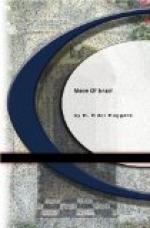“Well, let it be,” went on Bakenkhonsu, “till we find out the truth before Thoth. Ki was speaking of you, young man. I did not pay much attention to him, but it was something about a sudden vow of friendship between you and the Prince here. There was a cup in the story too, an alabaster cup that seemed familiar to me. Ki said it was broken.”
Seti started and I began angrily:
“What do you know of that cup? Where were you hid, O Priest?”
“Oh, in your souls, I suppose,” he answered dreamily, “or rather Ki was. But I know nothing, and am not curious. If you had broken the cup with a woman now, it would have been more interesting, even to an old man. Be so good as to answer the Prince’s question as to whether he or his cousin Amenmeses will triumph at the last, for on that matter both Ki and I are curious.”
“Am I a seer,” I began again still more angrily, “that I should read the future?”
“I think so, a little, but that is what I want to find out.”
He hobbled towards me, laid one of his claw-like hands upon my arm, and said in a new voice of command:
“Look now upon that throne and tell me what you see there.”
I obeyed him because I must, staring up the hall at the empty throne. At first I saw nothing. Then figures seemed to flit around it. From among these figures emerged the shape of the Count Amenmeses. He sat upon the throne, looking about him proudly, and I noted that he was no longer clad as a prince but as Pharaoh himself. Presently hook-nosed men appeared who dragged him from his seat. He fell, as I thought, into water, for it seemed to splash up above him. Next Seti the Prince appeared to mount the throne, led thither by a woman, of whom I could only see the back. I saw him distinctly wearing the double crown and holding a sceptre in his hand. He also melted away and others came whom I did not know, though I thought that one of them was like to the Princess Userti.
Now all were gone and I was telling Bakenkhonsu everything I had witnessed like a man who speaks in his sleep, not by his own will. Suddenly I woke up and laughed at my own foolishness. But the other two did not laugh; they regarded me very gravely.
“I thought that you were something of a seer,” said the old priest, “or rather Ki thought it. I could not quite believe Ki, because he said that the young person whom I should find with the Prince here this morning would be one who loved him with all the heart, and it is only a woman who loves with all the heart, is it not? Or so the world believes. Well, I will talk the matter over with Ki. Hush! Pharaoh comes.”
As he spoke from far away rose a cry of—
“Life! Blood! Strength! Pharaoh! Pharaoh! Pharaoh!”
CHAPTER IV
THE COURT OF BETROTHAL




